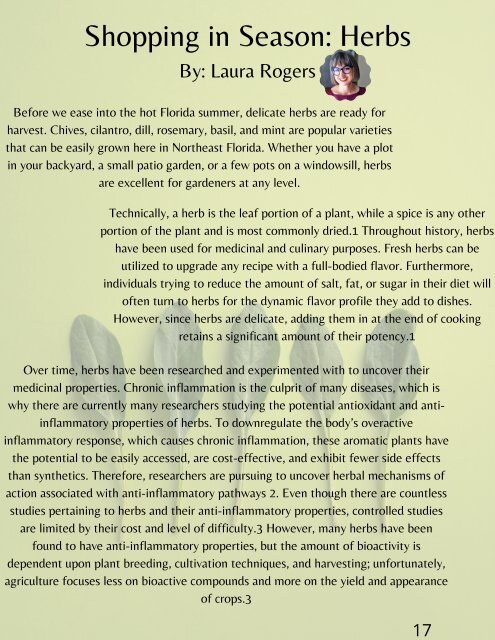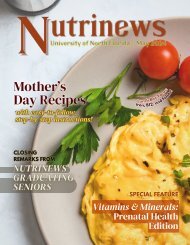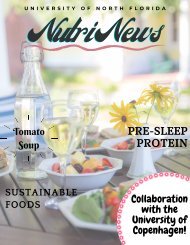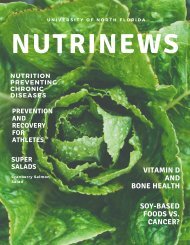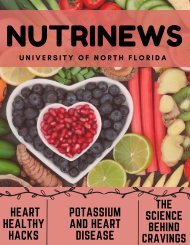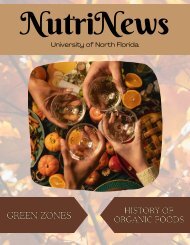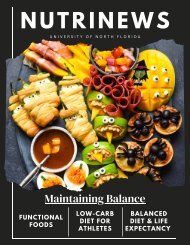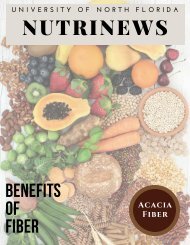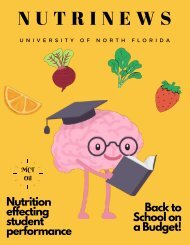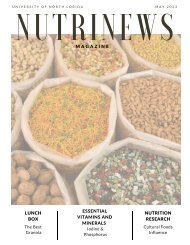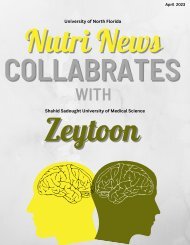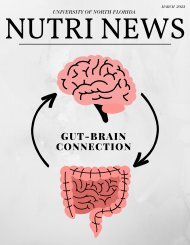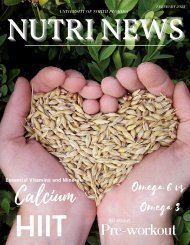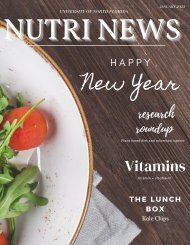march issue
Hello all! The theme for March is National Nutrition Month! Topics include How Nutrition Can Influence Our Health and The Evolution of Hospital Food. This month’s student spotlight is on our very own Alicia Blong. I hope you all enjoy, learn, and get inspired by this month’s articles and recipes!
Hello all!
The theme for March is National Nutrition Month! Topics include How Nutrition Can Influence Our Health and The Evolution of Hospital Food. This month’s student spotlight is on our very own Alicia Blong.
I hope you all enjoy, learn, and get inspired by this month’s articles and recipes!
You also want an ePaper? Increase the reach of your titles
YUMPU automatically turns print PDFs into web optimized ePapers that Google loves.
17<br />
Shopping in Season: Herbs<br />
By: Laura Rogers<br />
Before we ease into the hot Florida summer, delicate herbs are ready for<br />
harvest. Chives, cilantro, dill, rosemary, basil, and mint are popular varieties<br />
that can be easily grown here in Northeast Florida. Whether you have a plot<br />
in your backyard, a small patio garden, or a few pots on a windowsill, herbs<br />
are excellent for gardeners at any level.<br />
Technically, a herb is the leaf portion of a plant, while a spice is any other<br />
portion of the plant and is most commonly dried.1 Throughout history, herbs<br />
have been used for medicinal and culinary purposes. Fresh herbs can be<br />
utilized to upgrade any recipe with a full-bodied flavor. Furthermore,<br />
individuals trying to reduce the amount of salt, fat, or sugar in their diet will<br />
often turn to herbs for the dynamic flavor profile they add to dishes.<br />
However, since herbs are delicate, adding them in at the end of cooking<br />
retains a significant amount of their potency.1<br />
Over time, herbs have been researched and experimented with to uncover their<br />
medicinal properties. Chronic inflammation is the culprit of many diseases, which is<br />
why there are currently many researchers studying the potential antioxidant and antiinflammatory<br />
properties of herbs. To downregulate the body’s overactive<br />
inflammatory response, which causes chronic inflammation, these aromatic plants have<br />
the potential to be easily accessed, are cost-effective, and exhibit fewer side effects<br />
than synthetics. Therefore, researchers are pursuing to uncover herbal mechanisms of<br />
action associated with anti-inflammatory pathways 2. Even though there are countless<br />
studies pertaining to herbs and their anti-inflammatory properties, controlled studies<br />
are limited by their cost and level of difficulty.3 However, many herbs have been<br />
found to have anti-inflammatory properties, but the amount of bioactivity is<br />
dependent upon plant breeding, cultivation techniques, and harvesting; unfortunately,<br />
agriculture focuses less on bioactive compounds and more on the yield and appearance<br />
of crops.3


